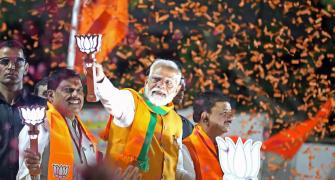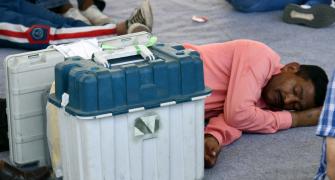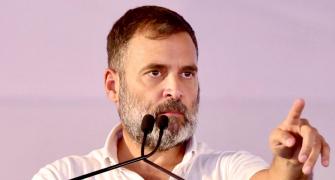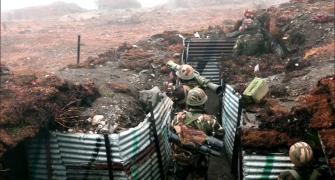The President, Dr A P J Abdul Kalam, said that environmental concerns must be integrated into the development agenda of any country wanting to tread on the path of change.
"The world has to work together to ensure this," he said while inaugurating the Delhi Sustainable Development Summit, organised by the Tata Energy Research Institute in in New Delhi on Thursday.
The theme this year at the summit is to work out ways to translate the deliberations of the Johannesburg Earth Summit into action. The global summit will go on till February 9.
"Any nation that has a vision to give prosperity and a safe society to its people has to first empower them. Only then can leaders be born who can bring about change. When political leaders empower people through visionary policies, the prosperity of the nation is certain," he said.
"One of the core competences of India is bio-diversity and if it is combined with technology, it will yield value-added products. What is needed is high productivity in agriculture and an integration of biodiversity and technology," he said.
The President said that India had one-sixth of the world's population and 26 per cent of Indian people were below the poverty line.
"The challenge is to help them go beyond poverty. To do this, the gross domestic product growth rate had to be doubled. GDP could grow only if we concentrate on integrating agriculture, food processing, education, healthcare, information and communication technology into governance."
Dr Kalam said that if a new deal has to be reached to seventy per cent of people in India who lives in villages, there has to be a physical connectivity that would ensure that they have access to school, health centers and the like.
This would bring in knowledge leading to electronic connectivity which would ensure that economic progress happens.
He said that we had seen what happened in the ten years after the Rio Earth Summit and even after twenty years, nothing would have changed unless society moved to create change.
Drinking water, he warned, was going to be a major problem. Agricultural scientists should address it by looking at technologies and water conservation.
Networking of rivers was a major project to manage the flood and drought conditions in India.
But to offset this regional hydro-imbalance, the need of the hour was to have a water mission to ensure water without compromising environmental safety or over exploitation of natural resources, he said.
Nitin Desai, Under Secretary General of the United Nations, said there were a series of commitments that had been reached at global meets before that just needed to be implemented to make a great change in the lives of common people.
In a hard-hitting speech, Desai said: "By 2015, we should be able to say that extreme poverty has been halved around the world, and there are major improvements in water, sanitation, primary education, mortality rate of children under five and the arrest of HIV-AIDS. Disparities among countries had to come down and this was possible only if we implement the resolutions at various summits."
Desai said that it was time that sustainability must be integrated into business.
Dr Sam Pitroda, chairman and chief executive officer, WorldTel Limited, United Kingdom, said that the role of information and communication technology (ICT) in sustainable development had not yet been appreciated.
"Though the ICT revolution had barely begun, it would profoundly transform our energy needs and work environment. ICT is a great social leveler and can balance the world and provided an unique opportunity to leapfrog into the future," he said.
Pitroda who revolutionised telecommunications in India said that the ICT revolution in India started in the mid eighties giving room to a lot of experiments.
Today, there were 40 million telephone connections and 10 million cell phones. In the next five years, he predicted, there would be around 100 million phones.
He said the challenge was to take ICT to the masses using e-learning, e-health, e-judiciary and so on. While education should be entertaining, entertainment should be educative, he added.
By just redesigning some processes, he said, information technology, could be used for a variety of applications like ration cards, school admissions, bank accounts, land records, death and birth certificates.
While he traveled in India in the last five weeks, he said that he found the major concern everywhere was governance. ICT, could modernize governance, he said.
Environment and Forests Minister T R Baalu said that sustainable development at global level would ensure greater good of humanity.
TERI, he pointed out was working for the last 25 years in sustainable development and had done well to hold such a summit to bring into focus issues of development and environment that could aid policy making.
Chad Holliday, chairman and chief executive officer, DuPont, USA, said that if any company wanted to survive for long, it had to be a leader seriously taking on the challenge of corporate social responsibility.
It would mean that companies take a market-back approach, he said, where it looks at the needs of people as well as the economic and development objectives of the countries it operated in.
Holliday said companies must have unshakeable values in both good and bad economic times. Companies must add value to what they do and not be just involved in making money, he said.
Dr R K Pachuari, director general of TERI, said that Bihar which was one of the richest regions in India for over 2000 years, slipped rapidly in the last 250 years.
The major reason for this, he pointed out, was a set of faulty policies related to natural resources in the state both in terms of exploitation and pricing. Even more serious has been the neglect of human resources, he said.
The summit will examine the goals set up by the World Summit for Sustainable Development in the areas of water and sanitation, meeting basic needs, protecting the environment, land use, forestry and biodiversity, governance issues and climate change.






